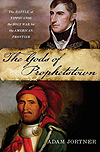 The Gods of Prophetstown: The Battle of Tippecanoe and the Holy War for the American Frontier, by Adam Jortner, Oxford University Press USA, New York, 2011, $27.95
The Gods of Prophetstown: The Battle of Tippecanoe and the Holy War for the American Frontier, by Adam Jortner, Oxford University Press USA, New York, 2011, $27.95
The year 2011 marked the 200th anniversary of the Battle of Tippecanoe and the stirrings of the little-remembered War of 1812. Authors have produced an avalanche of books about the latter conflict, including The Gods of Prophetstown, Adam Jortner’s dual biography of the clinically ambitious William Henry Harrison and the Shawnee spiritual leader Tenskwatawa, known as the Prophet.
Much has been written about Tenskwatawa’s charismatic brother, Tecumseh—a warrior who aligned several tribes in resistance to American territorial expansion. Lesser known is the Prophet, a recovering alcoholic and ne’er-do-well who, through prophesies and mysticism, became the Indian confederacy’s messianic light. Jortner plays down Tecumseh’s role, as he traces the paths taken by Harrison and Tenskwatawa, emphasizing their—and their respective nations’—religious beliefs as the driving force behind the battle for Middle America. He is fond of such overreaching statements as, “On the frontier…the War of 1812 was very much a religious war—the Great Spirit against providence—with the vast expanse of the Western frontier, a holy land, as the prize.”
The concept of religion as a driving cultural force is not unique. History is rife with struggles in which each faction believed they had God on their side. Jortner, however, takes his “holy war” argument too far and ultimately fails to convince. His causational fixation on religion taints an otherwise well-researched, detailed and interesting account of the conflict that ultimately brought about the death of Tecumseh, the end of Tenskwatawa’s vision and Harrison’s elevation to the presidency.
Jortner maintains that a white victory was never a foregone conclusion, and that had the Indians won at Tippecanoe, “the story of American nations and gods would have looked radically different.” His last page posits a scenario in which Tenskwatawa triumphs, and the entire future of the United States is altered. It is an ending that fits snugly into the “what if” school of history.
—Ron Soodalter




